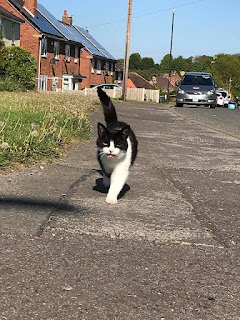Things are people too!
It only occurred to me the other day to google Autism and anthropomorphism. Thinking back, I suddenly grew suspicious of my very strong tendency to attribute emotional intelligence to things: to imagine it being possible to hurt a car's feelings for example, or my tendency to apologise to doors if I bang them.
This was undoubtedly learned behaviour because my mother dealt with my countless phobias by teaching me not to hurt things' feelings: Don't scream! The Hoover will be sad it's made you frightened and many similar phrases seeped into my psyche and took root. I did the same with my children and now they are doing it with theirs.
Watching other parents, I don't think that is so abnormal.
What feels possibly less like other people is the fact that in my sixties I still feel guilty for 'separating a stone from its friends' with a careless kick, work out which ducks are friends and which are lonely when I'm by the river, and feel sorry for lights in shops having to work all night.
This is so far from the emotional wasteland which I thought autistic people inhabited that I've never really thought about it as an expression of Neurodiversity.
I've been to various counsellors over the years. Only one of them picked up on what she called a lack of Empathy (which horrified me and sent me scuttling into the depths of my psyche for years until someone told me that was ridiculous). She was also the person who explained to me that we - well, feel feelings (the clue's in the name). Shame she didn't make a few connections and query autism.
So - we feel feelings? I don't. I have many 'feelings', I am emotionally intelligent and the characters I write about are very recognisably human... but my feelings are mostly processed in my head.
I realise now that I've simply never registered some of the physical signs of emotion. For example I soiled myself daily for the first few years of school and I now understand this was a response to the terror and overwhelm of being with so many children.
When I think about it, I was definitely hyper-sensorily aware. As well as the acute hearing I've already described, I vividly remember how my school smelt, even though so many other memories are missing. It was a large primary school on the edge of a Council estate and I remember it mainly as a collection of smells, not all pleasant.
The stage was the Pretend Play area and there were some ancient 'jam tarts' which I think one of the teachers must have made and varnished. To me, that was such a strong smell that it was what I noticed when I walked into school, although there were probably only half a dozen of them in a vast hall about a minute's walk from the entrance.
I remember how my shoes smelt, the whiff of warm milk when you peeled the silver top off the tiny 1/3 of a pint bottles, the warm, colourful scent of wax crayons, the smell of soap on certain children and the tang of snow and frost in the air in Autumn. To this day I go out in Autumn just to sniff the air and inhale memories.
I noticed the smells of all the children and found it really hard if I was seated next to someone dirty. I could smell wee and sweat and school dinners and the combination made me feel sick, and ensured that I usually contributed to the mix - I was too frightened to ask to go to the toilet and I don't think I would have had time anyway. I remember Mrs Marshall patiently cleaning me up in the staff room.
It seems incredible to me that nobody ever suggested investigating why I was doing this daily. Later, I was chronically constipated. I won't go into details but I still remember the pain. I now know how common bowel issues are for autistic children - I suspect this will be found to relate to the 'Gut Brain' and probably very much link into where and how we process emotions.
I'm working hard on linking what I am think-feeling to my bodily responses. I was thrilled the other day when I realised that a slight sensation in my chest meant that I didn't really want to go to an event - and so I didn't. That was huge progress.
As for empathy, well that's a strange one. I am known as hugely empathetic and although it feels like cheating if I compare myself with what I imagine to be normal, I realise that I do have a very good grasp of how people react and feel, it's just that for me it's more like running through a mental checklist rather than a gut response to their emotions.
So for example when I am talking to someone who has lost a family member, I am aware of a scrolling tickertape mental list of all the issues they may be facing, the things they might be thinking and the emotions they are experiencing, and I will draw on that to say the appropriate things or to keep the appropriate silence as they talk.
I don't often analyse how I do that of course. I just get on with it. There's still a tiny part of me which finds it cold and strange that I work this way when others describe being terribly moved and jumping in with their emotions into that same space, but I've come to realise that the end result is the same. As long as people feel heard, loved and supported it doesn't really matter how I get there. And a by-product of how I process things is that very often I am able to remain calm in awful situations, for example in Child Protection meetings which left other professionals in bits, I was often the person calmly probing how we could move forward.
Weird though isn't it, that these normal people can walk past a sweet wrapper in the street and not care at all that it might feel its useful life is over, or that it might be missing the other sweets it was in the packet with... Such a lack of empathy!😉




Comments
Post a Comment